Dumping the VEH in Windows 10
The Vectored Exception Handling (VEH) is a Windows mecanism to handle application exceptions.
Even if you have an official Windows API to add and remove handlers via AddVectoredExceptionHandler and
RemoveVectoredExceptionHandler, there is no official way to list all registered handlers in an application.
Inside the source code of ReactOS you can find a source file with these API reimplemented and it can give us
good information about how it works.
I needed to dump the VEH list to be able to bypass a game anticheat and because there is not a lot of information about how to do it on the internet, I sharing my solution with you.
VEH use case
The VEH can be used to catch all catchable exceptions, in our example we are catching a division by zero:
LONG NTAPI MyVEHHandler(PEXCEPTION_POINTERS ExceptionInfo) {
printf("MyVEHHandler (0x%x)\n", ExceptionInfo->ExceptionRecord->ExceptionCode);
if (ExceptionInfo->ExceptionRecord->ExceptionCode == EXCEPTION_INT_DIVIDE_BY_ZERO) {
printf(" Divide by zero at 0x%p\n", ExceptionInfo->ExceptionRecord->ExceptionAddress);
ExceptionInfo->ContextRecord->Eip += 2;
return EXCEPTION_CONTINUE_EXECUTION;
}
return EXCEPTION_CONTINUE_SEARCH;
}
int main() {
AddVectoredExceptionHandler(1, MyVEHHandler);
int except = 5;
except /= 0;
return 0;
}
Another application is done by CheatEngine which injects a DLL and use the VEH to catch hardware breakpoints. In consequence it can debug an application while bypassing the basics debugger checks.
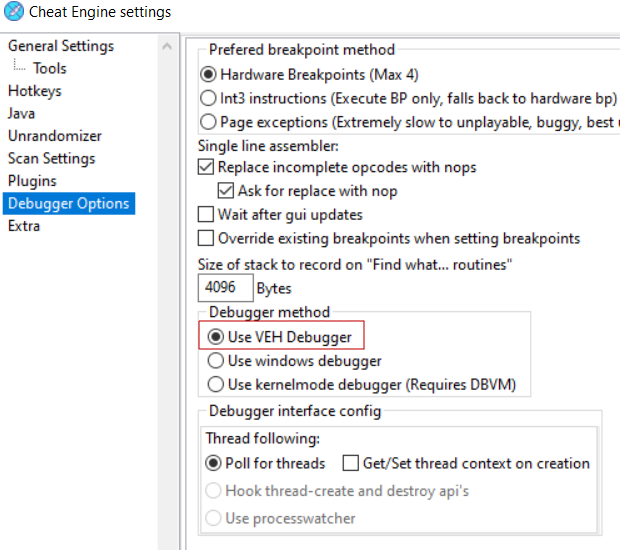
Exception path
When a CPU exception occurs, the kernel will call the function KiDispatchException (ring0) which will follow this
exception to the ntdll method KiUserExceptionDispatcher (ring3). This function will call
RtlDispatchException which will try to handle it via the VEH. To do it, it will read the VEH chained list via
RtlCallVectoredHandlers and calling each handlers until one return EXCEPTION_CONTINUE_EXECUTION. If a handler
returned EXCEPTION_CONTINUE_EXECUTION, the function RtlCallVectoredContinueHandlers is called and it will
call all the continue exception handlers.

The VEH handlers are important because the SEH handlers are called only if no VEH handler has caught the
exception, so it could be the best method to catch all exceptions if you don’t want to hook KiUserExceptionDispatcher.
If you want more information about the exceptions dispatcher, 0vercl0ck has made a good paper about it.
The chained list
The VEH list is a circular linked list with the handlers functions pointers encoded:
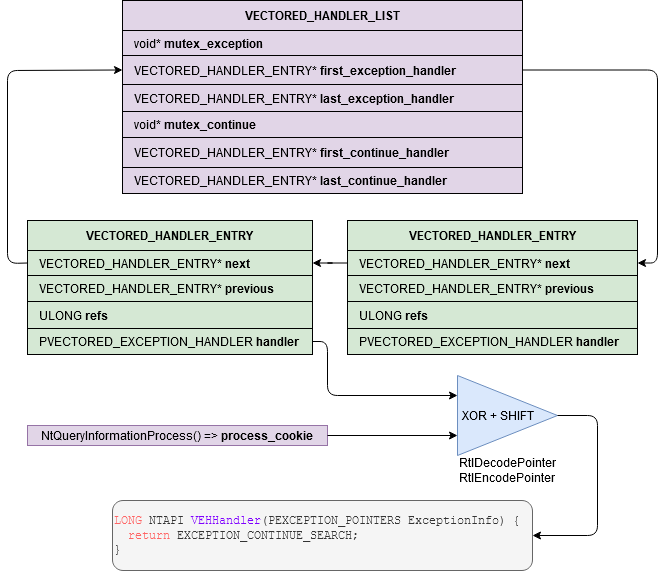
The exception handlers are encoded with a process cookie but you can decode them easily. If you are dumping the VEH
which is inside your own process, you can just use DecodePointer and you don’t have to care about the process
cookie. If it’s a remote process you can use DecodeRemotePointer but you will need to create your own function
pointer with GetModuleHandle("kernel32.dll") and GetProcAddress("DecodeRemotePointer").
The solution that I have chosen is to imitate DecodePointer by getting the process cookie with
ZwQueryProcessInformation and applying the same algorithm:
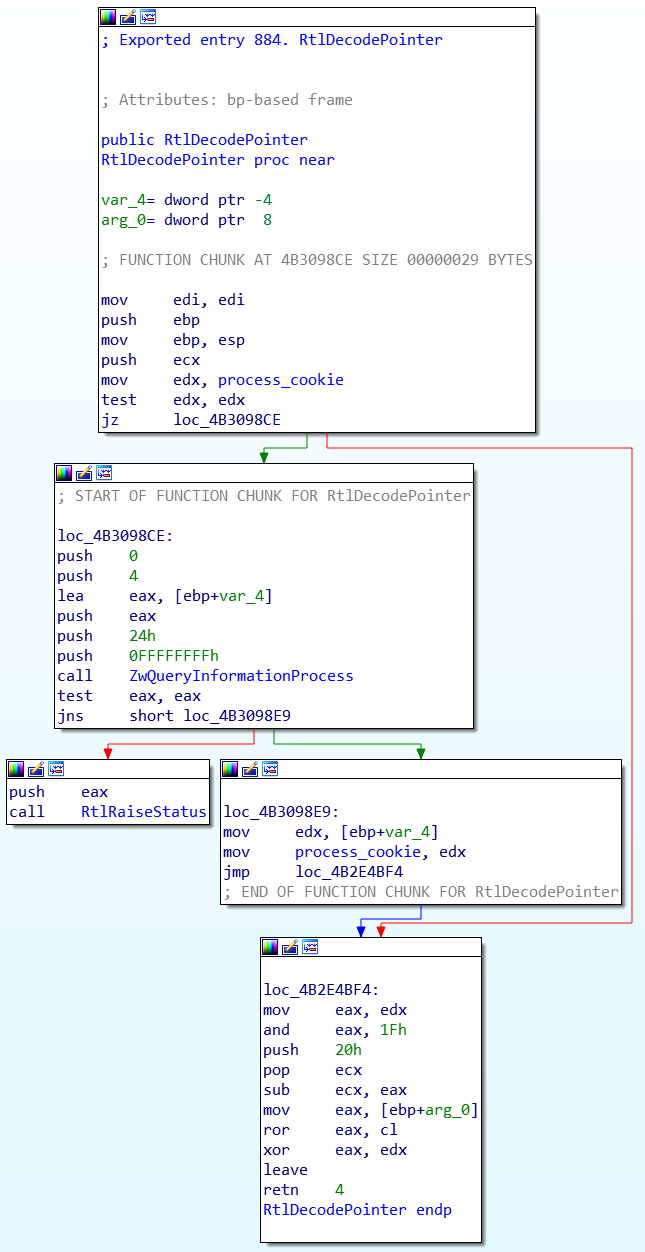
DWORD Process::GetProcessCookie() const {
DWORD cookie = 0;
DWORD return_length = 0;
HMODULE ntdll = GetModuleHandleA("ntdll.dll");
_NtQueryInformationProcess NtQueryInformationProcess =
reinterpret_cast<_NtQueryInformationProcess>(
GetProcAddress(ntdll, "NtQueryInformationProcess"));
NTSTATUS success = NtQueryInformationProcess(
process_handle_, ProcessCookie, &cookie, sizeof(cookie), &return_length);
if (success < 0) {
return 0;
}
return cookie;
}
#define ROR(x, y) ((unsigned)(x) >> (y) | (unsigned)(x) << 32 - (y))
DWORD Process::DecodePointer(DWORD pointer) {
if (!process_cookie_) {
process_cookie_ = GetProcessCookie();
if (!process_cookie_) {
return 0;
}
}
unsigned char shift_size = 0x20 - (process_cookie_ & 0x1f);
return ROR(pointer, shift_size) ^ process_cookie_;
}
Finding the VEH list offset
Even if you can find the symbol LdrpVectorHandlerList in the ntdll pdb, there is no official API to get it easily.
My solution is to begin by getting a pointer to RtlpAddVectoredHandler:
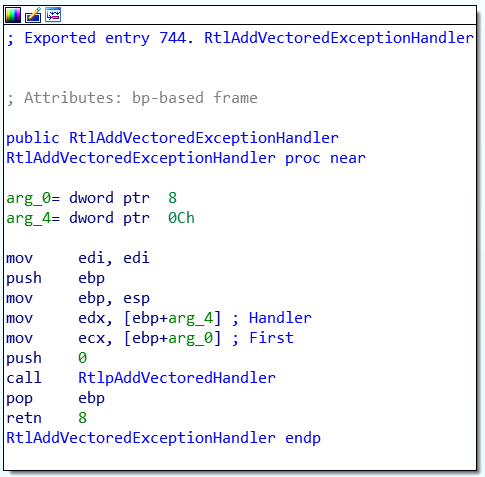
You can disassemble the method RtlAddVectoredExceptionHandler until you find the instruction call or you can
just pretend that its address is always at 0x16 bytes after it:
BYTE* add_exception_handler = reinterpret_cast<BYTE*>(
GetProcAddress(ntdll, "RtlAddVectoredExceptionHandler"));
BYTE* add_exception_handler_sub =
add_exception_handler + 0x16; // RtlpAddVectoredHandler
And from here the same byte offset method could work, but a simple signature system could prevent us to be broken after a small Windows update:
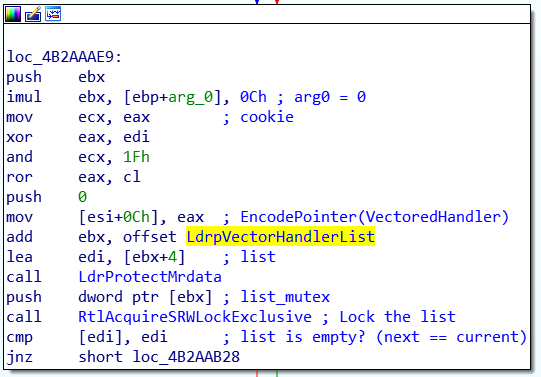
const BYTE pattern_list[] = {
0x89, 0x46, 0x0c, // mov [esi+0Ch], eax
0x81, 0xc3, 0, 0, 0, 0 // add ebx, offset LdrpVectorHandlerList
};
const char mask_list[] = "xxxxx????";
BYTE* match_list =
SearchPattern(add_exception_handler_sub, 0x100, pattern_list, mask_list);
BYTE* veh_list = *reinterpret_cast<BYTE**>(match_list + 5);
size_t veh_list_offset = veh_list - reinterpret_cast<BYTE*>(ntdll);
printf("LdrpVectorHandlerList: 0x%p (ntdll+0x%x)\n", veh_list, veh_list_offset);
Final code
#define ROR(x, y) ((unsigned)(x) >> (y) | (unsigned)(x) << 32 - (y))
DWORD Process::GetProcessCookie() const {
DWORD cookie = 0;
DWORD return_length = 0;
HMODULE ntdll = GetModuleHandleA("ntdll.dll");
_NtQueryInformationProcess NtQueryInformationProcess =
reinterpret_cast<_NtQueryInformationProcess>(
GetProcAddress(ntdll, "NtQueryInformationProcess"));
NTSTATUS success = NtQueryInformationProcess(
process_handle_, ProcessCookie, &cookie, sizeof(cookie), &return_length);
if (success < 0) {
return 0;
}
return cookie;
}
DWORD Process::DecodePointer(DWORD pointer) {
if (!process_cookie_) {
process_cookie_ = GetProcessCookie();
if (!process_cookie_) {
return 0;
}
}
unsigned char shift_size = 0x20 - (process_cookie_ & 0x1f);
return ROR(pointer, shift_size) ^ process_cookie_;
}
typedef struct _VECTORED_HANDLER_ENTRY {
_VECTORED_HANDLER_ENTRY* next;
_VECTORED_HANDLER_ENTRY* previous;
ULONG refs;
PVECTORED_EXCEPTION_HANDLER handler;
} VECTORED_HANDLER_ENTRY;
typedef struct _VECTORED_HANDLER_LIST {
void* mutex_exception;
VECTORED_HANDLER_ENTRY* first_exception_handler;
VECTORED_HANDLER_ENTRY* last_exception_handler;
void* mutex_continue;
VECTORED_HANDLER_ENTRY* first_continue_handler;
VECTORED_HANDLER_ENTRY* last_continue_handler;
} VECTORED_HANDLER_LIST;
DWORD GetVEHOffset() {
HMODULE ntdll = LoadLibraryA("ntdll.dll");
printf("ntdll: 0x%p\n", ntdll);
perror_if_invalid(ntdll, "LoadLibrary");
BYTE* add_exception_handler = reinterpret_cast<BYTE*>(
GetProcAddress(ntdll, "RtlAddVectoredExceptionHandler"));
printf("RtlAddVectoredExceptionHandler: 0x%p\n", add_exception_handler);
perror_if_invalid(add_exception_handler, "GetProcAddress");
BYTE* add_exception_handler_sub = add_exception_handler + 0x16;
printf("RtlpAddVectoredExceptionHandler: 0x%p\n", add_exception_handler_sub);
const BYTE pattern_list[] = {
0x89, 0x46, 0x0c, // mov [esi+0Ch], eax
0x81, 0xc3, 0, 0, 0, 0 // add ebx, offset LdrpVectorHandlerList
};
const char mask_list[] = "xxxxx????";
BYTE* match_list =
SearchPattern(add_exception_handler_sub, 0x100, pattern_list, mask_list);
perror_if_invalid(match_list, "SearchPattern");
BYTE* veh_list = *reinterpret_cast<BYTE**>(match_list + 5);
size_t veh_list_offset = veh_list - reinterpret_cast<BYTE*>(ntdll);
printf("LdrpVectorHandlerList: 0x%p (ntdll+0x%x)\n", veh_list,
veh_list_offset);
return veh_list_offset;
}
int main() {
auto process = Process::GetProcessByName(L"veh_dumper.exe");
perror_if_invalid(process.get(), "GetProcessByName");
printf("Process cookie: 0x%0x\n", process->GetProcessCookie());
DWORD ntdll = process->GetModuleBase(L"ntdll.dll");
VECTORED_HANDLER_LIST handler_list;
DWORD veh_addr = ntdll + GetVEHOffset();
printf("VEH: 0x%08x\n", veh_addr);
process->ReadProcMem(veh_addr, &handler_list, sizeof(handler_list));
printf("First entry: 0x%p\n", handler_list.first_exception_handler);
printf("Last entry: 0x%p\n", handler_list.last_exception_handler);
if (reinterpret_cast<DWORD>(handler_list.first_exception_handler) ==
veh_addr + sizeof(DWORD)) {
printf("VEH list is empty\n");
return 0;
}
printf("Dumping the entries:\n");
VECTORED_HANDLER_ENTRY entry;
process->ReadProcMem(
reinterpret_cast<DWORD>(handler_list.first_exception_handler), &entry,
sizeof(entry));
while (true) {
DWORD handler = reinterpret_cast<DWORD>(entry.handler);
printf(" handler = 0x%p => 0x%p\n", handler,
process->DecodePointer(handler));
if (reinterpret_cast<DWORD>(entry.next) == veh_addr + sizeof(DWORD)) {
break;
}
process->ReadProcMem(reinterpret_cast<DWORD>(entry.next), &entry,
sizeof(entry));
}
}
I plan to release a VEH debugger which works by shellcode injection, maybe it will be the subject of a next article. Please take note that I have done it on a 32 bits process but it can be done on a 64 bits process too.